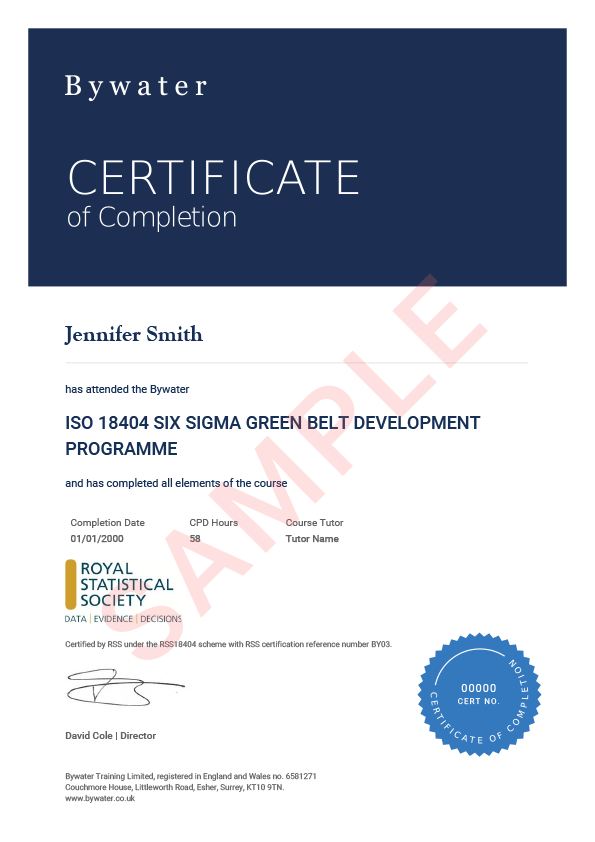RSS 18404 Six Sigma Green Belt Development Programme
DURATION
8 daysCPD
Equivalent to 58 hoursCERTIFICATES
All delegates will receive a certificate on completion.DELIVERY OPTIONS
Course Approval

Gain the Six Sigma knowledge and practical experience at Green Belt level to improve business processes in your organisation by attending this RSS certified Six Sigma Green Belt Development Programme.
- our 5-day Lean Six Sigma Green Belt training course, covering key topics such as the organisational benefits of Lean Six Sigma, DMAICT methodology, stakeholder management, Lean principles, risk management and practical problem-solving
- 2 further days of practical experience in applying Lean Six Sigma Green Belt competencies within a case study, including justifying business process improvement, identifying root causes, and presenting projects
- 1 day preparation for Green Belt certification against ISO 18404 through the RSS 18404 Sector Scheme
- 1-1 coaching with a Master Black Belt to support delegates who wish to make their own RSS application
It is also recommended for those:
- wishing to gain practical experience applying Lean Six Sigma Green Belt competencies
- undertaking improvement activities as part of their role
- responsible for implementing improvements in a project or more widely
- working within organisations which have achieved, or are seeking to achieve, ISO 18404 certification
As this course incorporates our certified Lean Six Sigma Green Belt training course, no prior knowledge is required.
Students who have already completed the Six Sigma Green Belt training course need only attend the final 3 days of this course. Contact our training team to book.
Please note that the course incorporates mathematical and statistical elements. Delegates are required to use Excel, or similar, during the course within the exercises.
- ISO 18404:2015 overview and certification requirements
- Lean, Six Sigma and Lean Six Sigma (LSS) roles
- process thinking and the LSS toolkit
- DMAIC(T) project management
- stakeholder management
- lean principles
- change management
- risk management
- sustainability and control
- statistics, data and problem solving
- data acquisition for analysis
- statistical concepts (sampling, frequency distributions, hypothesis testing)
- practical problem solving (root cause analysis and localisation)
- Six Sigma tools
- regression and correlation
- designed experiments
- analysis of variance
- statistical process control (SPC)
- statistical software use
- practical application of Lean Six Sigma Green Belt competencies
- defining the project
- justifying business process improvement
- identifying benefits and project risks
- identifying process issues and root causes
- identifying and proving solutions
- documenting and presenting projects
- preparing for Green Belt certification through the RSS 18404 Sector Scheme
- review of ISO 18404 competency requirements
- building a portfolio of competencies
- progress review
- mock assessment centre
- Day 1
- WELCOME AND INTRODUCTIONS
- ISO 18404:2015 & Certification Requirements
- Introduction to Lean, Six Sigma & Lean Six Sigma Roles
- Lean Six Sigma & the Relationship to Quality, Efficiency and Productivity
- Process Thinking and the (Lean) Six Sigma Toolkit
- Exercise: Claims Authorisation Process
- CLOSE
- Day 2
- DMAIC(T) Project Management & Decision Making
- Exercise: Formulate a Project Charter & Stakeholder Analysis for a LSS Project
- Interpersonal & Team Leadership Skills Stakeholder Management
- Exercise: Major Activities – Inputs and Outputs
- Creativity Tools & Defining the Project Mission
- Exercise: Enlightenment Process
- Exercise: Applying the Problem Definition Sheet and 5W2H Method
- Exercise: 5 Why’s
- Principle & Practice of Lean Value Stream Analysis
- Exercise: Value Added
- Exercise: Construct a Value Stream Map
- CLOSE
- Day 3
- Change Management
- Exercise: Syndicate Exercise: Successfully Managing Change for Lean Six Sigma
- Leadership and Motivation
- Exercise: Development and Independence Level Analysis form
- Exercise: Belbin questionnaire & Conflict Questionnaire
- Customer Focus
- Exercise: House of Quality
- Risk Management
- Exercise: Identify & Evaluate Risks Associated with a Green Belt Project Proposal
- Sustainability & Control
- Presentation & Reporting Skills
- CLOSE
- Day 4
- Numeracy
- Data Acquisition for Analysis
- Exercise: Appropriate Data
- Statistical Concepts
- Exercise: Tutor Led Exercises on Microsoft Excel
- Practical Problem Solving
- CLOSE
- Day 5
- Six Sigma Tools
- Statistical Software Use
- Summary
- CLOSE
- Day 6
- Practical Application of LSS Green Belt Competencies
- Exercise: The Birthday Process
- Defining the Project, Justifying Business Process Improvement & Identifying Benefits & Project Risks (Competencies 1, 2, 4, 8, 12, 16 &17)
- Identifying Process Issues & Root Causes (Competencies 10, 13, 15 & 16)
- CLOSE
- Day 7
- Identifying & Proving Solutions (Competencies 7, 10, 12, 13, 16, 19, 21 & 22)
- Documenting & Presenting Project and Solution (Competency 14)
- Winning Team Training (Competencies 3, 11, 20 & 23)
- Individuals & Teams to Describe Own Strengths and Plans (competency 18)
- CLOSE
- Day 8
- Review of ISO 18404 Competency Requirements
- Building Your Portfolio of Competencies
- Progress Review
- Mock Assessment Centre
- CLOSE
- define a Lean Six Sigma Green Belt project, identifying the benefits and project risks
- apply root cause analysis techniques to identify factors for process improvements
- implement solutions and verify benefits delivered
- work effectively with others to achieve objectives
- identify and understand their own strengths and plan for self-development
- plan, manage and contribute to Six Sigma improvement projects
- train others to perform at the same level
Successful attendance on this course will contribute towards becoming certified under Sector Scheme RSS 18404. Delegates who achieve ISO 18404 certification will be eligible to join the RSS register, which is used by organisations to identify certified Lean and Six Sigma professionals.
All delegates will receive an RSS approved ISO 18404 Six Sigma Green Belt certificate following completion of the programme.

In-company training availability
Receive this course exclusively for your organisation, either in-person at your chosen venue or online in our user-friendly Virtual Classroom.
Enjoy cost-effective flexibility and personalised learning with tailored messaging designed to address your unique business challenges.
| In-Person | |
|---|---|
| Delegate numbers | Up to 12 |
| Total fees | £13390 + VAT |
| Virtual Classroom | |
|---|---|
| Delegate numbers | Up to 10 |
| Total fees | £12490 + VAT |
What's included
- Delegate certificates of attendance.
- Comprehensive course materials and handouts.
- All tutor expenses and courier fees.
- Free cancellation up to 13 working days before commencement.
For courses held outside the UK or requiring significant adjustments, we will clearly inform you of any additional fees before you book.
Next steps
Find out our availability and enquire about this course by completing the form and our training team will get in touch with you.
Alternatively contact us on 0333 123 9001 or email contact@bywater.co.uk to discuss your requirements.
Enquire
Complete the following form to enquire about this course and our training team will be in touch.
Bywater offers training options at Green Belt level to acquire new skills with or without attaining certification.
Our 5-day Lean Six Sigma Green Belt training course provides full training with expert tutors. You will receive a certificate after the course demonstrating your new level of understanding and the fact that the course is approved by the Royal Statistical Society.
If you wish to achieve individual certification under the Royal Statistical Society’s 18404 Sector Scheme, then this 8-day Six Sigma Green Belt Development programme is right for you. The programme begins with our standard Green Belt training, before taking an additional 3 days to focus on the practical application of your Green Belt competencies, along with Assessment Centre practice and individual coaching to support an RSS 18404 application.
Bywater became a Royal Statistical Society (RSS) Approved Training Organisation in 2021. The RSS has approved all of our Six Sigma training courses, confirming that our training covers the competency requirements as defined in the ISO 18404 standard, and as interpreted in the RSS 18404 Sector Scheme, which sets out the requirements for certification against ISO 18404.
To meet RSS requirements, all our tutors have to be approved by the RSS. That means they must demonstrate experience in their subjects, in managing courses, and in facilitating skills. Our highly capable Six Sigma tutors include Master Black Belts who participated in the development of ISO 18404.
No. Many of our delegates successfully gain the insights and practical expertise they need in their roles from our Green Belt training course, without attempting to achieve certification. If you attend the Green Belt training course you will receive a certificate stating your new skill level, which you can share around your organisation and on LinkedIn, for example.
Some delegates do wish to achieve certification from the RSS through its Sector Scheme and enjoy additional benefits. For example, those who become certified are eligible to join the RSS register, which is used by organisations to find Lean and Six Sigma professionals. This RSS certification does require applicants to attend training and undertake an assessment to provide substantial evidence of their practical experience at Green Belt level.
Assessment by the Royal Statistical Society (RSS) is typically conducted online. You will be required to submit a portfolio of evidence of practice and competency two weeks before your assessment takes place. Two RSS appointed assessors will then review the evidence and interview you. You will also need to undergo a test and make a presentation.
Customer reviews
Bevan Motor Bodies|24th Mar, 2025
Sentric Safety Group|14th Feb, 2025
Pandrol Ltd|14th Feb, 2025
Glazpart Ltd|13th Feb, 2025
Element Materials Technology|6th Feb, 2025
Fountain Fresh Imports Ltd|26th Nov, 2024
Ooni Limited|19th Nov, 2024
Wanner International Ltd|12th Nov, 2024
3t Global|5th Nov, 2024
Fiander Tovell|11th Sep, 2024
Binding Solutions Ltd|10th Sep, 2024
Nanoco Technologies Ltd|21st Jun, 2024

